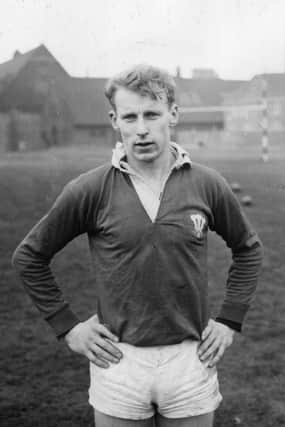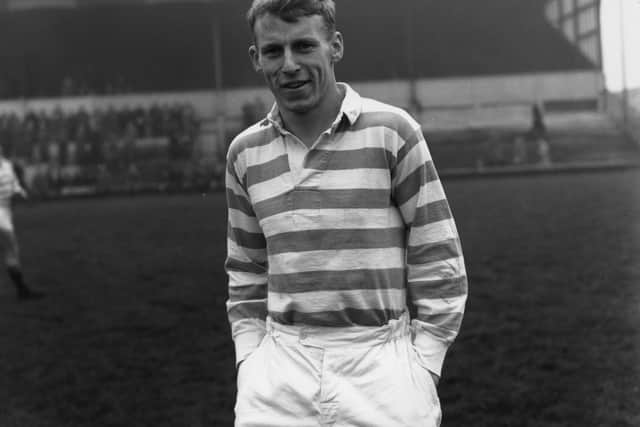From modesty and reticence to dwarf-tossing and “1,000 women” – how the lives of rugby men have changed


“James may have slept with 1,000 women … but it’s ME who reaps all the benefits,” gasps the Sun’s headline. James is James Haskell, the former England forward, and his wife, the woman presumably bunking down on the floor every night, there being more notches than bedpost in this arrangement, is Chloe Madeley, Richard and Judy’s girl.
I was flicking through Scotland’s book - recalling the enjoyable afternoon last year listening to his reminisces, also Gareth Edwards being in awe of the old full-back when I met the Welsh wizard - on the day the oval ball game got a little bit more brazen, and a big bit more risible.
Advertisement
Hide AdAdvertisement
Hide AdRemember when Danny Cipriani was a cover star for GQ magazine as Page 3 pin-up Kelly Brook grappled with the ex-England stand-off in a not dissimilar way to how he might be tackled during a game, only involving more lipstick and fewer clothes? That seemed like a moment, all right, in the, er, progress of the pro game. But Haskell, who himself previously dated Brook, has topped it with his other half’s revelations which presumably he sanctioned.


It is easy, of course, to find dramatic contrast between two men playing the same sport in different eras and these turn up all the time in football. When a rugby player goes all showbizzy, though, it is disconcerting and - this might just be me - not a little sad.
Maybe it is me. For perhaps Scotland and Haskell are both revolutionaries. Our man ripped up the handbook for full-back play and Haskell is showing how the post-rugby career can be more fun than putting on a suit and being employed to tell your company’s clients stories from the scrum.
He seems to have copied the beauty-and-the-beast routine of Mike Tindall, but while the latter’s wife is a minor Royal, Madeley is the daughter of a prissy, Peter Pan-ish daytime TV moralist. Nevertheless, Haskell and Madeley are popular with the colour supplements and those websites which like their subjects in swimwear and lycra, and this pair always seem cheerfully forthcoming with the personal quotes.
Still on the first page of the Edinburgh-born, 27-times-capped Scotland’s memoirs, we’re told that his formative years were spent in a very different time and place, where “modesty, good manners and reticence were characteristic virtues. Showing off and displays of emotion were frowned upon … ”


Hogmanay, 1954 was not a rave-up. Scotland and best pal from George Heriot’s School, Eddie McKeating, having just turned out for London Scottish School, couldn’t afford the Sleeper back to Edinburgh so sat up all night in their carriage with a half-bottle of port and two screwtops. Hogmanay, 1955 was spent in a Toulouse nightclub, but moderately, because the pair were playing the next day for the Combined Services. On Hogmanay, 1956 they received letters informing them they would win their first caps together, against France in Paris.
Scotland’s revolutionary acts were, when he gathered a punt, not to boot it straight back upfield but to run with the ball - and when he was kicking to use his instep. That sounds pretty rudimentary but Scotland once played in a game against Wales where the opposition skipper, Clive Rowlands, aimed for touch relentlessly, resulting in a staggering 111 lineouts. Imagine the relief, and the thrill, of a player not only keeping the ball in the park but doing something imaginative with it. No wonder Murrayfield, and Gareth Edwards, loved him.
Scotland, now 83, also excelled with a cricket bat; Haskell’s second sport will be mixed martial arts, once Covid allows him to make his combat debut. Haskell played rugby for his country on 50 more occasions than Scotland but then the rugby calendar is much more hectic nowadays, what with the World Cup.
Advertisement
Hide AdAdvertisement
Hide AdAh, the World Cup. Remember the 2011 tournament in New Zealand? England’s dwarf-tossing, pier-jumping and crestfallen quarter-final exit? Haskell has told all in memoirs of his own and the fact the promotional campaign is ongoing probably explains the candour of his wife.


If the newspaper extracts are any guide, rugby scholars will be disappointed by this tome and its cursory game info. A typical sentence goes: “After the win against Scotland we were told that the maid had sold her story … ” This was the hotel worker to whom Haskell had been somewhat ungallant. He certainly displayed none of the “modesty, good manners and reticence” that was around in his fellow author’s time.
He tries to explain that no Kiwis of reduced stature were launched vertically by a member of the proud Red Rose VX. “Unfortunately,” he adds, “the nightclub posted pictures of the lads rolling about on the floor with dwarves on Facebook and a bouncer sold CCTV footage to a journalist.”
Haskell complains that Ireland and Wales drank far more than England at the World Cup but were portrayed as “fun-loving” while his lot were “a bunch of entitled wankers”. Well, those are the breaks, and for the record, after his international debut and victory against the French, KJF Scotland over-celebrated but woke to find the press had been kind to him with one report speaking of a “pale-faced, slim-chested young man in a kilt sipping a pineapple juice … ”
Our Ken admits: “‘Pissed in the Pigalle’ would have been more accurate!”
Ken Scotland: The Autobiography is published by Polaris, £17.99.
A message from the Editor:
Thank you for reading this story on our website. While I have your attention, I also have an important request to make of you.
With the coronavirus lockdown having a major impact on many of our advertisers - and consequently the revenue we receive - we are more reliant than ever on you taking out a digital subscription.
Subscribe to scotsman.com and enjoy unlimited access to Scottish news and information online and on our app. With a digital subscription, you can read more than 5 articles, see fewer ads, enjoy faster load times, and get access to exclusive newsletters and content. Visit https://www.scotsman.com/subscriptions now to sign up.
Our journalism costs money and we rely on advertising, print and digital revenues to help to support them. By supporting us, we are able to support you in providing trusted, fact-checked content for this website.
Joy Yates
Editorial Director
Comments
Want to join the conversation? Please or to comment on this article.
